Japanese Customs to Keep in Mind"

This section explains the various Japanese lifestyles and Japanese customs to keep in mind.
◆Taking off your shoes at home
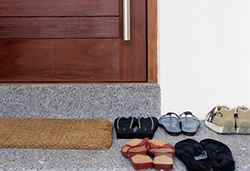
Japanese people take off their shoes when entering the house.

◆ Going to a public bath

There are public baths located within different areas of the city, and Japanese people have a culture of bathing even with people whom they do not know. You take off your clothes when entering the public bath, and wash your body outside of the bathtub. You cannot bring your soap or towel into the bathtub.

◆ Sleeping on Futons

Japanese people have traditionally slept on futons in tatami rooms. There are two types of futons, one for blanket use and the other for mattress use. You lay the mattress futon on the floor and cover it with linen, and place the blanket futon over the mattress that you sleep on.

◆ Putting away your Futons
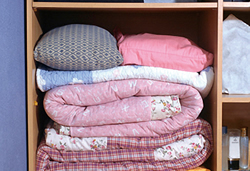
Japanese people put their futons away in the closet everyday. It is not common to leave your futons out all day. Fold the mattress futon in 4, and the blanket futon in 3 when putting them away. By putting away your futon, you can use your room spaciously for other purposes such as studying, dining, or hosting company.

◆ Tatami
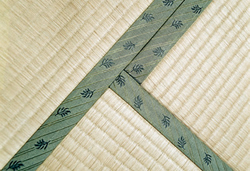
Japanese housing traditionally uses tatami for flooring. Tatami is made from straw, and contains much air, which provides spring. Tatami serves as an insulator to keep the heat out during the summer and cold out during the winter. The drawback is that if you use chairs and tables on the tatami, the tatami will wear-out and be damaged. Therefore, please refrain from using furniture that could damage the tatami.

◆ Hanging your laundry
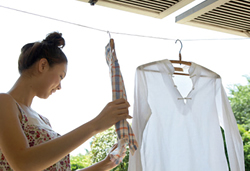
It is customary for Japanese people to dry their laundry outside their rooms. After washing clothes in the laundry machine, people hang their clothes on a pole and dry them out on the balcony. People also dry their futons out in the sun and wind, hanging their laundry out on a nice sunny day.

◆ Using the Japanese style bathroom
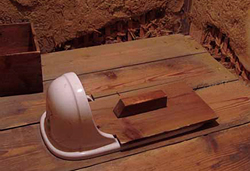
Buildings that are old or are located in the suburbs or countryside have Japanese style bathrooms.

◆ Separating garbage

There are specific rules for separating garbage. Please keep in mind that these rules may differ depending on where you live. Generally, these rules specify what day of the week, time, and type of garbage you can take out. (For example, you might only be able to take out burnable garbage in the morning by 8:30AM on Tuesdays and Fridays.) Please make sure you follow these rules, as this could cause trouble for your neighbors. Garbage collectors will only collect garbage that follows these rules.

◆ Bowing

Japanese people bow for greetings and for expressing feeling of appreciation. People bow deeply when apologizing. It is very appropriate to bow lightly when saying hello to your neighbors.







